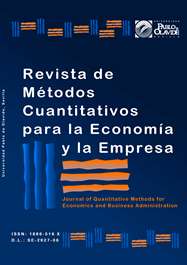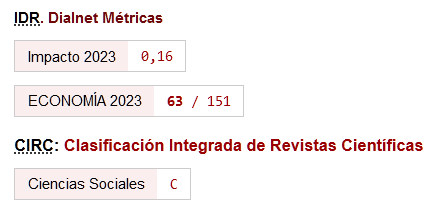Effects of Inefficiency on Marginal Costs, Degree of Economies of Scale and Technical Change: A Theoretical Relationship
DOI:
https://doi.org/10.46661/revmetodoscuanteconempresa.2804Keywords:
cost efficiency, marginal cost, degree of economies of scale, technical change, portsAbstract
In this paper, a theoretical relationship is obtained to measure the effect that inefficiency has on marginal costs, degree of economies of scale and technical change. It is shown that when the relationship between inefficiency and output level is ignored, the estimation of marginal costs and the degree of economies of scale are incorrect. The measurement of technical change is also wrongly calculated if one does not consider the variation of inefficiency over time. This could lead to incorrect pricing decisions that would transfer inefficiency to the consumer via prices and non-optimal investments in productive capacity. In addition, the effect of technical change on costs could be erroneously estimated. The empirical application of this theoretical model to Spanish port authorities during the period 2008-2016 shows that marginal costs of port services were overestimated, the degree of economies of scale was underestimated and the time variations of the inefficiency were interpreted erroneously as technical change when the relationship between inefficiency and output and time is not considered.
Downloads
References
Aigner, D.J., Lovell, C.A.K., & Schmidt, P. (1977). Formulation and estimation of stochastic frontier production function models. Journal of Econometrics, 6(1), 21-37.
Atkinson, S., & Cornwell, C. (1994). Parametric estimation of technical and allocative inefficiency with panel data. International Economic Review, 35, 231-244.
Atkinson, C., & Halvorsen, R. (1984). Parametric efficiency test, economies of scale and input demand in U.S. electric power generation. International Economic Review, 25, 647-662.
Battese, G.E., & Coelli, T.J. (1995). A model for technical inefficiency effects in a stochastic frontier production function for panel data. Empirical Economics, 20, 325-332.
Bauer, P. W. (1990). Decomposing TFP growth in the presence of cost inefficiency, non constant returns of scale, and technological progress. Journal of Productivity Analysis, 1, 287-301.
Díaz-Hernández, J.J., Martínez-Budría, E., & Jara-Díaz, S. (2008). Parametric estimation of inefficiency in cargo handling in Spanish ports. Journal of Productivity Analysis, 30, 223-232.
Farrell, M.J. (1957). The measurement of productive efficiency. Journal of the Royal Statistical Society, Serie A, General 120, Part 3, 253-281.
Jara-Díaz, S., Martínez-Budría, E., Cortés, C. and Basso L. (2002). A multioutput cost function for the services of Spanish ports' infrastructure. Transportation, 29, 419-437.
Jara-Díaz, S., Martínez-Budría, E., & Díaz-Hernández, J.J. (2006). Multiple output in port cost function. Port Economics Research in Transportation Economics, 16, 67-84.
Kumbhakar, S.C. (1997). Modelling allocative inefficiency in a translog cost function and cost share equations: an exact relationship. Journal of Econometrics, 76(1/2), 351-356.
Kumbhakar, S.C., & Lovell, C.A.K. (2000). Stochastic frontier analysis. USA: Cambridge University Press.
Lau, L.J., & Yotopoulos, P.A. (1971). A test for relative efficiency and application to Indian agriculture. American Economic Review, 61, 94-109.
Meeusen, W., & Van den Broeck, J. (1977). Efficiency estimation from Cobb-Douglas production functions with composed error. International Economic Review, 18(2), 435-444.
Shephard, R.W. (1953). Cost and production functions. Princeton, NJ: Princeton University Press.
Shephard, R.W. (1970). Theory of cost and production functions. Princeton, NJ: Princeton University Press.
Toda, Y. (1976). Estimation of a cost function when cost is not a minimum: The case of soviet manufacturing industries, 1958-1971. Review of Economics and Statistics, 58, 259-268.
UNCTAD (1975). Port pricing. New York: United Nations.
Published
How to Cite
Issue
Section
License
Copyright (c) 2020 Journal of Quantitative Methods for Economics and Business Administration

This work is licensed under a Creative Commons Attribution-ShareAlike 4.0 International License.
Submission of manuscripts implies that the work described has not been published before (except in the form of an abstract or as part of thesis), that it is not under consideration for publication elsewhere and that, in case of acceptance, the authors agree to automatic transfer of the copyright to the Journal for its publication and dissemination. Authors retain the authors' right to use and share the article according to a personal or instutional use or scholarly sharing purposes; in addition, they retain patent, trademark and other intellectual property rights (including research data).
All the articles are published in the Journal under the Creative Commons license CC-BY-SA (Attribution-ShareAlike). It is allowed a commercial use of the work (always including the author attribution) and other derivative works, which must be released under the same license as the original work.
Up to Volume 21, this Journal has been licensing the articles under the Creative Commons license CC-BY-SA 3.0 ES. Starting from Volume 22, the Creative Commons license CC-BY-SA 4.0 is used.










